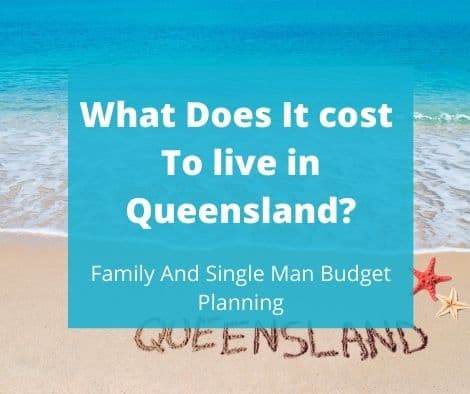Queensland
According to the latest Australian Bureau of Statistics (ABS) survey on consumption patterns, Queensland households spend more than $76,000 a year on general living expenditures. Also, growing expenses for housing, food, electricity, and transportation are eating up the majority of people’s wages.
Monthly living costs
| Costs | Living costs for a family | Living costs for a single person |
| Rent | 1700$-2160$ | 480$-1760$ |
| Utility cost | 225$-400$ | 150$-175$ |
| Food/ Groceries | 1045$-1250$ | 320$-600$ |
| Mobile phone cost | 160$-240$ | 80$-120$ |
| Local transportation | 100$-250$ | 50$-100$ |
| Total | 3230$-4300$ | 1080$-2755$ |
Room Share in Queensland
In Queensland, it is relatively normal to share a fully equipped room with a separate entrance and toilet with a student. Those residences are often located near a bus stop to stores and the University. The average cost per week is $170, which includes all utilities. Students or working people can use these.
Average rent and other costs
The middle apartment area in Queensland is 930 square feet, though this figure differs widely based on the unit type, with affordable and luxurious options for both homes and flats. The average rent for a flat in Queensland is $1,717, up 5% from the previous year’s figure of $1,642. The average monthly gas bill in Queensland was $172.
Only around a third of Queenslanders have changed gas suppliers in the previous two years, which makes sense given that 73 percent of bill-payers believe they receive a fair bargain on gas. The average usage of gas is 4.93c/MJ.
The average electricity cost in Queensland was just under $1,240. People discovered that bill-payers aged 40-49 had the most extensive maximum electricity bills by a long shot, at $1,548. Bill-payers in their 70s and older tend to have low average bills in Queensland, at $836. Water costs in Queensland average $300 every quarterly, which is at the bottom of the pack compared to other cities.
According to a study, 48% of Queensland bill-payers feel they are overpaying for water, while almost half of families try to reduce water consumption to save money.
Queenslanders had the second-lowest average weekly food spend. At $139, which works out to $556 per month or $6,672 per year. Moreover, a quarter of buyers prefer to buy domestic grocery goods over big brands. And over half say private supermarket labels are of a high standard.
Reasons to live in Queensland
- Natural elegance: Queensland’s beautiful scenery is one of its many attractions. Beautiful coral reefs, sandy beaches, breathtaking mountains, and lush jungles abound. If people prefer being in nature, they will adore living in this beautiful state. The prospect of waking up to a beautiful sight every day may be enough to convince anyone to relocate to Queensland.
- The weather is excellent: Queensland has a subtropical climate with 300 days of sunlight per year. It has hot or mild weather for most of the year. It is perfect for making it an ideal location for all types of tourists. People will have little trouble adjusting to the state’s dampness and summer temperature. They may also spend time at the beach with their family or friends while enjoying this type of weather.
- Culture diversity and a laid-back attitude: This state boasts a diverse population and a thriving arts and culture scene. Staying here will be simpler for people since they will be able to adjust to the people quickly. Queensland also has a laid-back attitude, making it easier to remain in and socialize with the people. People will have no trouble mixing with other people since they will be welcomed.
- Advanced Economic situation: Queensland is one of Australia’s more developed states. It is a venue where technical and scientific progress, such as information and communication technology, biotechnology, and the tech industry, may be seen. As soon as people start living here, people will notice a significant improvement in your life. Queensland is without question the ideal spot to begin a new life with their family. There will be nothing to regret if people choose to reside in this state because it offers tremendous changes such as those listed above. So, people should start planning their move today and have the fun of their life in the beautiful state of Queensland. They will undoubtedly have the experience of a lifetime.
Brisbane
The typical cost of living in Brisbane for a single individual range is from $400 to $750 a week, based on the living situation.
Living Cost:
Expenses Amounts Flat for 1 person in City Centre AU$1684.09 Flat for 1 person outside of Centre AU$1232.38 Flat for the family inside City Centre AU$2816.52 Flat for the family outside of Centre AU$1958.18 Average rent and other costs
The average Brisbane rent per week is $415 for households and $395 for units. This is a 3.8 percent rise for residences and a 3.9 percent rise for units over the previous quarter. The average quarterly gas bill in Brisbane was $172. Just around a quarter of Brisbane residents have changed gas suppliers in the previous two years. This partially explains that 73 per cent of bill-payers believe they receive a fair price on gas.
The Australian Gas Network in Brisbane and yearly gas use of 6,842MJ are used to calculate these anticipated annual expenditures. However, rates will change based on the situation. At the same time, the average annual electric costs in Brisbane were just under $1,240. The bill-payers aged 40-49 had the highest average costs by a significant margin. At $1,548. Bill-payers in their 70s and older reported lower average bills in Brisbane, at $836.
Brisbane residents spend an average of $300 every quarter on water bills. Which is in the middle of the pack when compared to other cities. 48% of Brisbane bill-payers think they are overpaying for water. However, almost half of families attempt to reduce water consumption to save money. Brisbane residents had the second-lowest average weekly food price of $139, which works out to $556 per month or $6,672 per year.
More than a quarter of buyers prefer to buy local grocery brands over huge names, and over the half-day private stores, labels are of high quality. The anticipated monthly expenditure for a family of four is 3,710 dollars.
Reasons to live in Brisbane
- Brisbane is a vibrant city: Each day is a festival in Brisbane. The city is alive with busy shopping malls, lively bars, gorgeous historical sites, sun-drenched beaches, and an intense music and arts environment. If it isn’t enough to grab people’s interest, the weather will. Brisbane’s climate is pleasant and mild, with approximately 300 days of sunshine a year.
- Brisbane is fantastic, even on a small budget: Brisbane, Australia’s fourth most cheap city for students. It offers excellent value for money. At $436 (AUD) per week, the average rent is the third-lowest among Australia’s major cities. Furthermore, there are many free activities to do in Brisbane for a student.
- Brisbane is Australia’s most environmentally friendly city: Brisbane has become known across Australia for its vast biodiversity, with over 2,000 green spaces and over 2,500 plant species. It’s a dream come true for everyone who wants to study in the woods. The verdant City Botanic Gardens, located just underneath the beautiful Mt Coot-tha, feature forest meadows, bamboo forests, and beautiful lily ponds.
- Brisbane is vibrant, cultural, and colourful: Brisbane is one of Australia’s largest cities in the world. So people will be encircled by rich, bright, and varied communities no matter where they go. Taking a look at Brisbane’s jam-packed schedule to see what they mean. That means a lot of cultural events.
Canberra
Canberra has been named the most suitable location to live in Australia. For the third year in a row, the capital city received the most excellent quality of life score in the Australia Index study. The city had a 62.3 out of 100 for being a decent place to live, which is higher than the national average of 59.3 points.
Living cost
Expenses Amounts Weekly Rent Rooms share $180 Non-shared $324 Food/ Groceries $103-$167 Mobile cost $25-$50 Utility Cost $41 Average rent and other costs
Canberra is the costliest city in the country for renters right now. The typical weekly rent in the capital is $657, up 3.6 percent from last year. Flat rentals are also rising, albeit slower, with the average presently standing at $473 per week. In 2019, the average yearly gas bill was $1,547. In addition, the average gas household consumes 42,078 MJ per year.
Despite electricity, where rules oblige energy suppliers to set a minimum price, gas sellers are free to set their pricing. As a result, there is a remarkable price difference between Canberra’s lowest and costliest gas programs.
In 2019, the average yearly gas bill was $1,547. Canberra households may wish to shop there for a development design. Because they have the highest average annual power cost of $1,967. Water and sewage cost an average Canberra family $539.38 per year, while water costs around $600 per year.
For a family, the yearly living cost will be around $10,000 in Canberra.
Reasons to live in Canberra
- It is Australia’s best cost-effective ‘top destination’: Canberra is Australia’s second most inexpensive city for students. Students’ usual costs have been calculated by the Australian National University (ANU). Because of Canberra’s cheaper cost of living in Australia for international students, people’s money will stretch farther. Allowing people to afford more amusement and vacations.
- It is the most educated city in Australia: Canberrans are significantly more likely to have post-graduate credentials than Australians from outside towns. Possibly due to the area’s substantial university sector. Canberra also has the most significant percentage of persons who have finished year 12 or an equivalent qualification. As a result, Canberra is a very intellectual city. In other words, it is an excellent place to study.
- Canberra is one of the safest cities in Australia: Not only has Canberra developed a strong, cooperative, and supportive group, but it also has one of the lowest crime rates of any major Australian city. As a result, commuting to and from university, going for an evening stroll, walking, or cycling among Canberra’s lovely parks and gardens, lakes, and recreational places is likely to feel safer.
- Canberra is a cosmopolitan and diversified city: Canberra is linked domestically, but it is also tied to the rest of the world. More than a quarter of Canberra’s population was born outside of the country. Canberra also has a unique multicultural feel due to the vast number of international offices in the region. Canberra holds the National Diversity Festival in February.



